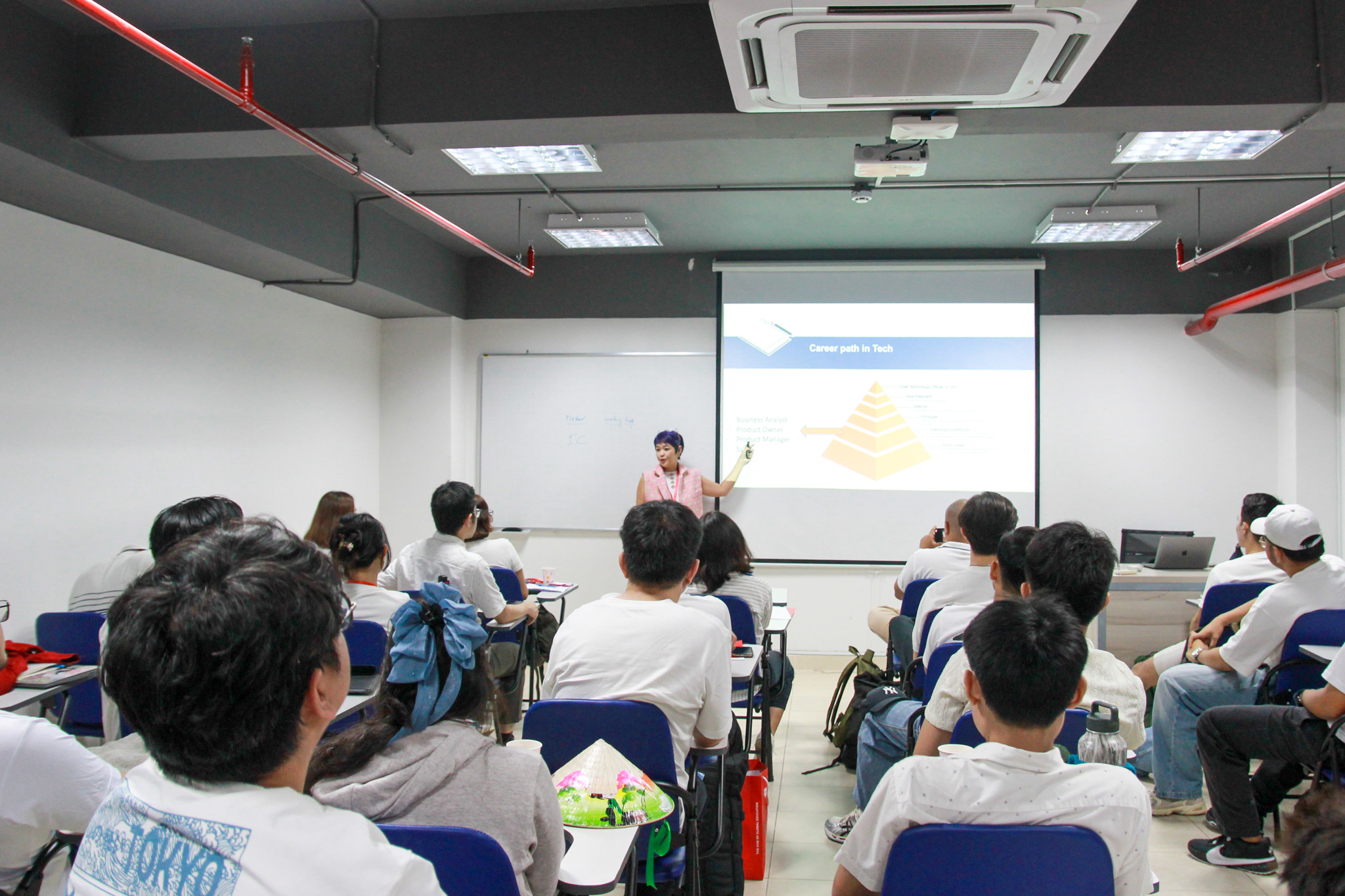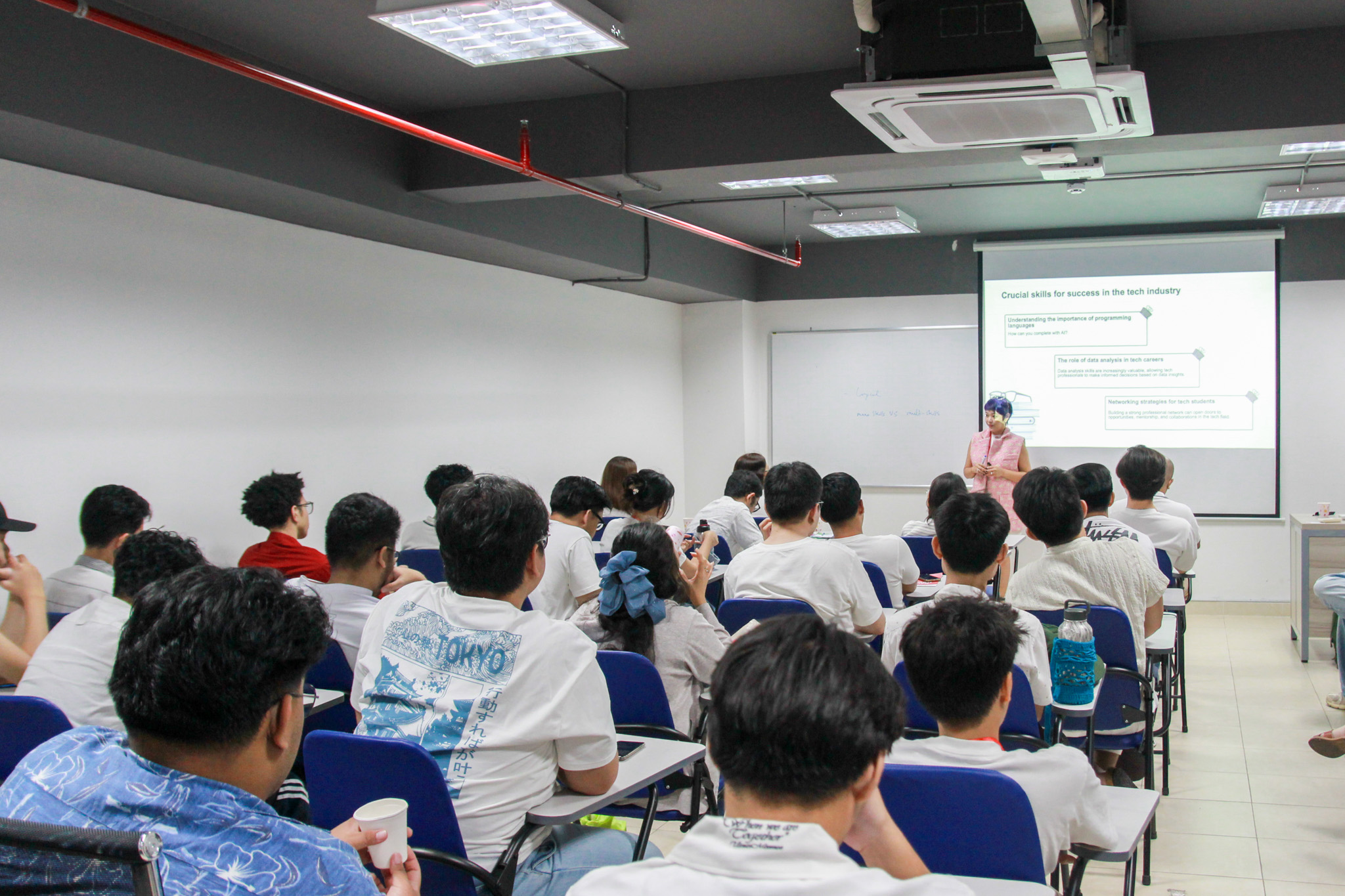Students from San Carlos University had an engaging exchange session with Ms. Trần Ngọc Thảo – a lecturer in Business Administration at Saigon Business School (SBS). The discussion focused on career opportunities in the tech industry and provided valuable insights on how to identify key elements that can help impress employers right from the CV stage. Let’s take a look at the standout highlights from this inspiring session!
What skills do top tech companies look for?
In an era of accelerated globalization driven by digital transformation, Information Technology is no longer just a career field—it has become the backbone of modern infrastructure, reshaping every industry from finance and healthcare to manufacturing and education. The explosive growth of AI, Big Data, Cloud Computing, and Cybersecurity has triggered an unprecedented global demand for high-quality tech talent—not only in developed economies but across the globe.

Global Trends: High Demand – Fast Pace – Intense Competition
From Silicon Valley (USA) to high-tech clusters in Singapore, data hubs in Berlin, and Bangalore—the heart of India’s tech industry—global tech giants are actively seeking candidates who demonstrate systems thinking, mastery of core technologies, and soft skills essential for thriving in multicultural environments. According to McKinsey & Company, by 2030, over 85 million jobs in tech could go unfilled unless the workforce is adequately reskilled and upskilled.
So, what are the core qualities that top companies like Google, Meta, Amazon, and Microsoft are truly looking for?

Career Strategy: Long-Term Thinking with Measurable Goals
Building a well-defined career plan with clear, phased objectives is what separates sustainable growth from reactive job-hopping in today’s fast-moving tech landscape.
Ask yourself:
- Where do you see yourself in the next five years?
- As a global Software Engineer, a Data Analyst at a multinational bank, or the Founder of your own tech startup?
To shorten that journey, structured internships tied to real business challenges are a critical launchpad—bridging the gap between academic learning and professional readiness.
Professional Networking: Social Capital as a Strategic Asset
Technology evolves at breakneck speed, but professional relationships provide long-term stability and open doors to opportunities not found in textbooks.
An effective networking strategy should include:
- Leveraging alumni networks: A treasure trove of professionals working across top-tier organizations.
- Joining industry associations and conferences: A chance to engage with emerging trends and showcase your potential.
- Building a strong digital personal brand on platforms like LinkedIn, GitHub, and Stack Overflow by sharing insights, projects, and thought leadership.
In a rapidly globalizing tech job market, networking is no longer optional—it’s essential for survival and growth.
Core Skills in Tech: A Blend of Technical Mastery & Human Intelligence

Success in tech isn’t solely built on code. The following skill sets are now considered must-haves in top-tier recruitment processes:
Technical Skills:
- Multilingual programming proficiency: Languages like Python, JavaScript, Java, SQL are the universal tongue of modern systems.
- Data analysis & visualization: Mastery of tools like SQL, Power BI, Tableau, R, and Python enables data-driven decisions.
- Foundational knowledge in system architecture, cloud platforms (AWS, Azure), API integration, and DevOps is a major plus.
Soft Skills:
- Problem-solving mindset: The core of innovation and continuous improvement.
- Effective technical communication, especially in cross-functional teams.
- Adaptability and self-learning: Vital in a world where tech updates are constant and disruptive.
Crafting a Competitive Tech Resume: Strategy Meets Storytelling
A tech resume is more than a skills list—it’s your career roadmap. Today’s recruiters want to see:
- Real-world projects with tangible outcomes and clearly defined roles.
- Experience in internships, research, hackathons, or open-source contributions.
- Professionally structured content with quantifiable results (e.g., “Improved system performance by 40% via API refactoring”).
Bonus points for global certifications such as:
- AWS Certified Developer
- Google Data Analytics
- Scrum/Agile certifications
Conclusion: Technology Is the Door – Strategy Is the Key
Success in the tech industry isn’t built on luck. It’s the outcome of:
- A clear and strategic career vision,
- Real-world technical competence,
- A strong professional network,
- And a resilient mindset that thrives in a world of constant change.
In an age where data, technology, and people converge, you won’t go far unless you start today.